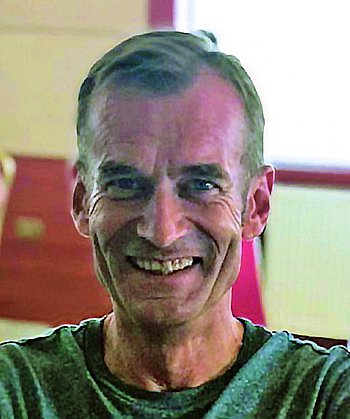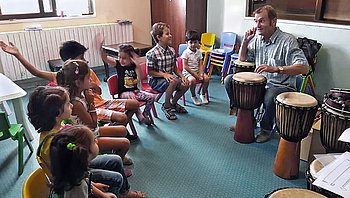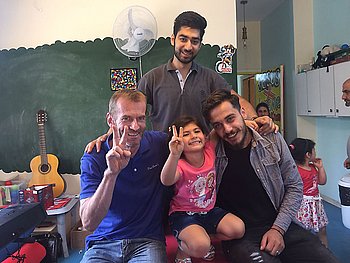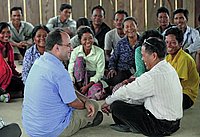Interview
"You have to dare to take the first step and leap out into the unknown. You only have something to gain!"

Reiner Haus, accompanied by his wife, Heidi, went to work in Jordan from 2015 to 2020 for Coworkers – CFI. The local partner organisation was a Nazarene congregation that organises support for refugees. Rainer Haus worked in refugee camps near Amman and Mafraq on the Syrian border.
His work focussed on diagnosing and treating refugee children who had been traumatised and were slow learners as well as training local professionals in rehabilitation and providing trauma therapy.
Reiner Haus now lives in Dortmund and works at the University of Dortmund.
Mr Haus, what motivated you to undertake development service? Where did the inspiration come from?
I’d already had many years’ experience of working abroad when I founded a model music therapy course in Latvia and then continued running it for 17 years. I was also involved in developing rehabilitation and therapeutic care throughout the country. This meant that our family was socialised in Latvia for many years. When our children eventually went their own way, my wife and I asked ourselves: "If not now, when?" It was the right window of opportunity for us to follow our inner calling and go and work in a country where help is needed and where we could make a difference – off the beaten track of a conventional career path.
It was the influx of Syrian refugees here in Germany in 2014 and the plight of refugees in Syria’s neighbouring countries that gave us the final push. During 2014 we used the year to build relationships with Syrian and Iraqi refugee families in emergency refugee accommodation in Dortmund. Then we left for Jordan in 2015.
Why did you choose a Christian sending agency?
We went to Jordan with Coworkers – CFI, a Christian agency, because we very much liked their approach: working with small-scale, grassroots projects in the countries where they deploy people. This made it possible for us to get directly involved at the local level. And the Christian faith-based ethos suited us too because it resonated with the inner calling which were hearing as we sought to live out our personal Christian faith.

What was it like for you and your wife to leave Jordan and return to Germany?
We returned in the middle of 2020, in the middle of the first wave of the pandemic. That was far from ideal, because it made the important process of saying “Goodbye” and handing over the work much more difficult and even impossible in many ways. Because of this, we went back to Jordan a year later to make sure that the structures we had built up there for training/teaching and therapeutic care were handed over to competent successors.
What also made it very difficult for us to return after five years abroad was that we had learned to appreciate the completely different way of communicating in an Arab country and had even adopted it ourselves. People greet each other and share so much more at the personal level and don’t hesitate to reference God – not only in private conversation, but also in commercial or administrative settings. The separation between private social life – which is of course very rich in Germany too in terms of relationships – and business life or the service sector – is unknown in Jordan. That makes a big difference – both in private and in public communication. Of course, we value German culture and the quality of services here. But our return was not easy for either of us.
It was especially difficult for my wife, who was an accompanying partner during my development service. What helped me was that I got back into work straight away. And this smoothed our transition in many ways. However, for my wife, who wanted to give herself time to find her way back, this was a difficult transition period.
What was the process of returning to work like for you?
When I left for Jordan, there were a lot of raised eyebrows among my professional colleagues at the university. Few people understood why I gave up my job here – a very good job with a lot of potential – to go and undertake development service. But when I returned, I found that all the doors were open to me. My boss even approached me directly. So, in this respect, my return wasn’t a rupture. Indeed, it was quite the opposite. I was able to build on old contacts and the institutions of higher education that existed before I left.
Was your range of competencies extended by undertaking development service?
I learned Arabic. And I learned to listen in a different way. During everyday life in Jordan, I experienced what "normal communication" is like for people there. It is very different from our way of communicating because the two worlds of people and things are much more closely interwoven. There are a lot of Syrian and Iraqi refugee families here in Germany now. It helps me a lot that I’ve internalised this cultural difference in communication and am able to communicate accordingly when I meet with these families. During the first year after our return, for example, I was able to use this in my work at a special school where there were a lot of children of Arab origin.
You can’t learn this kind of intercultural competence by reading about it. You have to learn from lived experience. And now I’m building up a new subject area of teaching and research here at the University of Dortmund. It’s about developing the intercultural competence of people who are going to teach in special schools.
How would you rate your five years of development service now? Would you encourage other people to take a similar step?
I always tell my students that they should be sure to follow even the slightest inkling of an inner prompting to set off on a divergent “career path” and do something altogether out of the ordinary. Teachers are needed everywhere. Here in Germany, they have the status of civil servants and enjoy financial security through to retirement. However, it can be enormously rewarding – for oneself as well as for locals – to serve the common good in another country or another culture for a while. This is what I believe and how I rate development service: You have to dare to take the first step and leap out into the unknown. You only have something to gain!
The interview was conducted as part of the AGdD Tracer Study 2022 for the publication "Die Welt im Gepäck. Returned professionals from the development service in the years 2011-2022". The interview was conducted by Dieter Kroppenberg.



